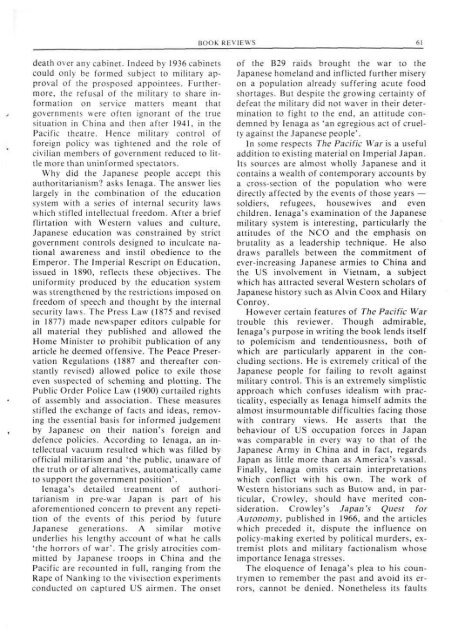ISSUE 24 : Sep/Oct - 1980 - Australian Defence Force Journal
ISSUE 24 : Sep/Oct - 1980 - Australian Defence Force Journal
ISSUE 24 : Sep/Oct - 1980 - Australian Defence Force Journal
- No tags were found...
You also want an ePaper? Increase the reach of your titles
YUMPU automatically turns print PDFs into web optimized ePapers that Google loves.
BOOK REVIEWS 61death over any cabinet. Indeed by 1936 cabinetscould only be formed subject to military approvalof the prosposed appointees. Furthermore,the refusal of the military to share informationon service matters meant thatgovernments were often ignorant of the truesituation in China and then after 1941, in thePacific theatre. Hence military control offoreign policy was tightened and the role ofcivilian members of government reduced to littlemore than uninformed spectators.Why did the Japanese people accept thisauthoritarianism? asks Ienaga. The answer lieslargely in the combination of the educationsystem with a series of internal security lawswhich stifled intellectual freedom. After a briefflirtation with Western values and culture,Japanese education was constrained by strictgovernment controls designed to inculcate nationalawareness and instil obedience to thetmperor. The Imperial Rescript on Education,issued in 1890, reflects these objectives. Theuniformity produced by the education systemwas strengthened by the restrictions imposed onfreedom of speech and thought by the internalsecurity laws. The Press Law (1875 and revisedin 1877) made newspaper editors culpable forall material they published and allowed theHome Minister to prohibit publication of anyarticle he deemed offensive. The Peace PreservationRegulations (1887 and thereafter constantlyrevised) allowed police to exile thoseeven suspected of scheming and plotting. ThePublic Order Police Law (1900) curtailed rightsof assembly and association. These measuresstifled the exchange of facts and ideas, removingthe essential basis for informed judgementby Japanese on their nation's foreign anddefence policies. According to Ienaga, an intellectualvacuum resulted which was filled byofficial militarism and 'the public, unaware ofthe truth or of alternatives, automatically cameto support the government position'.Ienaga's detailed treatment of authoritarianismin pre-war Japan is part of hisaforementioned concern to prevent any repetitionof the events of this period by futureJapanese generations. A similar motiveunderlies his lengthy account of what he calls'the horrors of war'. The grisly atrocities committedby Japanese troops in China and thePacific are recounted in full, ranging from theRape of Nanking to the vivisection experimentsconducted on captured US airmen. The onsetof the B29 raids brought the war to theJapanese homeland and inflicted further miseryon a population already suffering acute foodshortages. But despite the growing certainty ofdefeat the military did not waver in their determinationto fight to the end, an attitude condemnedby Ienaga as 'an egregious act of crueltyagainst the Japanese people'.In some respects The Pacific War is a usefuladdition to existing material on Imperial Japan.Its sources are almost wholly Japanese and itcontains a wealth of contemporary accounts bya cross-section of the population who weredirectly affected by the events of those years —soldiers, refugees, housewives and evenchildren. Ienaga's examination of the Japanesemilitary system is interesting, particularly theattitudes of the NCO and the emphasis onbrutality as a leadership technique. He alsodraws parallels between the commitment ofever-increasing Japanese armies to China andthe US involvement in Vietnam, a subjectwhich has attracted several Western scholars ofJapanese history such as Alvin Coox and HilaryConroy.However certain features of The Pacific Wartrouble this reviewer. Though admirable,Ienaga's purpose in writing the book lends itselfto polemicism and tendentiousness, both ofwhich are particularly apparent in the concludingsections. He is extremely critical of theJapanese people for failing to revolt againstmilitary control. This is an extremely simplisticapproach which confuses idealism with practicality,especially as Ienaga himself admits thealmost insurmountable difficulties facing thosewith contrary views. He asserts that thebehaviour of US occupation forces in Japanwas comparable in every way to that of theJapanese Army in China and in fact, regardsJapan as little more than as America's vassal.Finally, lenaga omits certain interpretationswhich conflict with his own. The work ofWestern historians such as Butow and, in particular,Crowley, should have merited consideration.Crowley's Japan's Quest forAutonomy, published in 1966, and the articleswhich preceded it, dispute the influence onpolicy-making exerted by political murders, extremistplots and military factionalism whoseimportance Ienaga stresses.The eloquence of Ienaga's plea to his countrymento remember the past and avoid its errors,cannot be denied. Nonetheless its faults

















